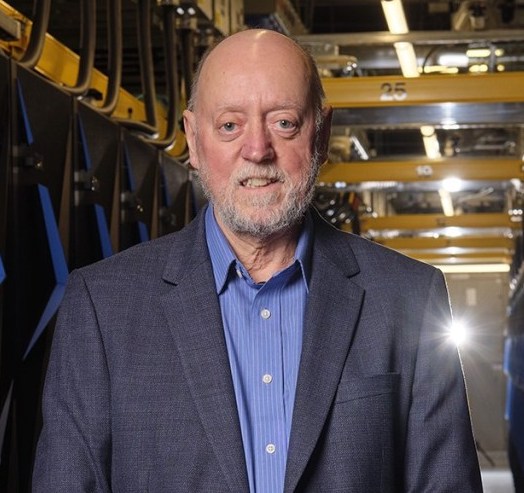News and Announcements
IEEE Computer Pioneer Award
 ICL Director and UTK Distinguished Professor Jack Dongarra will receive the 2020 IEEE Computer Pioneer Award for his “leadership in the area of high-performance mathematical software.” The Computer Pioneer Award was established in 1981 by the IEEE Computer Society to recognize and honor the efforts of those who contributed to the creation and continued vitality of the computer industry. Congratulations, Jack!
ICL Director and UTK Distinguished Professor Jack Dongarra will receive the 2020 IEEE Computer Pioneer Award for his “leadership in the area of high-performance mathematical software.” The Computer Pioneer Award was established in 1981 by the IEEE Computer Society to recognize and honor the efforts of those who contributed to the creation and continued vitality of the computer industry. Congratulations, Jack!
Yves Receives Charles Babbage Award
 ICL collaborator and frequent visitor Yves Robert has been selected to receive the 2020 IEEE Computer Society Charles Babbage Award for “contributions to parallel algorithms and scheduling techniques.”
ICL collaborator and frequent visitor Yves Robert has been selected to receive the 2020 IEEE Computer Society Charles Babbage Award for “contributions to parallel algorithms and scheduling techniques.”
The award consists of a $1,000 honorarium, certificate, and an invitation to present at the annual IEEE International Parallel and Distributed Processing Symposium (IPDPS) in New Orleans on May 18–22, 2020. Congratulations, Yves!
2020 Winter Reception
For 2020, ICL’s annual Winter Reception was bolstered by the addition of our comrades from Michela Taufer’s Global Computing Laboratory. The gathering, once again held at Calhoun’s on the River, offered a new opportunity for members of ICL, GCLab, and their loved ones to eat, drink, and socialize as we look forward to the spring semester and warmer days ahead.
The Editor would like to thank Jack Dongarra and Hidehiko Hasegawa for their contributions.
Recent Releases
2020 ICL Annual Report
 For almost 20 years, ICL has produced an annual report to provide a concise profile of our research, including information about the people and external organizations who make it all possible.
For almost 20 years, ICL has produced an annual report to provide a concise profile of our research, including information about the people and external organizations who make it all possible.
Please download a copy and check it out. You can also view all of our past reports here.
ScaLAPACK 2.1.0
ScaLAPACK 2.1.0 is now available. The Linear Algebra PACKage (LAPACK) and Scalable LAPACK (ScaLAPACK) are widely used libraries for efficiently solving dense linear algebra problems. ICL has been a major contributor to the development and maintenance of these two packages since their inception. LAPACK is sequential, relies on the BLAS library, and benefits from the multi-core BLAS library. ScaLAPACK is parallel, distributed, and relies on the BLAS, LAPACK, MPI, and BLACS libraries.
ScaLAPACK 2.1.0, which includes a new robust ScaLAPACK routine for computing the QR factorization with column pivoting along with improved accuracy of the Frobenius norm, was released in November 2019. Other improvements include:
- MPI-3+ updates required by Open MPI 4;
- miscellaneous bug fixes; and
- improved CMAKE shared library support.
Check out the ScaLAPACK website to download the tarball.
Interview

Mohammed Al Farhan
Where are you from, originally?
Saudi Arabia.
Can you summarize your educational background?
I earned my MS in Computer Science in 2013, and I earned my PhD in Computer Science in 2019—both from the King Abdullah University of Science and Technology (KAUST). I earned my BS in 2012 in Computer Science from King Faisal University (KFU).
Where did you work before joining ICL?
I worked as a Software Engineer at the Saudi Electricity Company for six months, and I had two internships as a Software Engineer at Saudi Aramco—three months each.
How did you first hear about the lab, and what made you want to work here?
The first time I heard about ICL was during a guest lecture about Dense Linear Algebra in HPC at KAUST. This was in the fall of 2012. I joined ICL because I want to broaden my HPC research experience in Dense Linear Algebra, which is an important HPC aspect that I did not work on during my PhD studies.
What is your focus here at ICL? What are you working on?
I am focusing on developing scalable dense linear system solvers optimized for accelerator-driven HPC systems. I am working on the ECP SLATE project.
What are your interests/hobbies outside of work?
I enjoy reading (philosophy, psychology, history, science, and novels), watching soccer and following its news, and learning new programming languages and/or programming models.
Tell us something about yourself that might surprise people.
In early 2011, I weighed around 228 pounds (103 KG). However, now I weigh roughly 159 pounds (72 KG).
If you weren’t working at ICL, where would you like to be working and why?
I would probably be working at Intel, because during my PhD research I was heavily involved in studying Intel hardware; in particular, I worked on developing performance-centric HPC algorithms targeting the Intel Xeon Phi architecture.
































